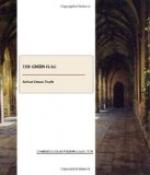“But I maun speak to Mr. Wilson.”
The young Cantab stepped forward.
“Well, my lad, what is it?”
“It’s aboot t’ fight, Mr. Wilson, sir. I wanted to tell your mon somethin’ aboot t’ Maister.”
“We’ve no time to listen to gossip, my boy. We know all about the Master.”
“But thou doan’t, sir. Nobody knows but me and mother, and we thought as we’d like thy mon to know, sir, for we want him to fair bray him.”
“Oh, you want the Master fair brayed, do you? So do we. Well, what have you to say?”
“Is this your mon, sir?”
“Well, suppose it is?”
“Then it’s him I want to tell aboot it. T’ Maister is blind o’ the left eye.”
“Nonsense!”
“It’s true, sir. Not stone blind, but rarely fogged. He keeps it secret, but mother knows, and so do I. If thou slip him on the left side he can’t cop thee. Thou’ll find it right as I tell thee. And mark him when he sinks his right. ’Tis his best blow, his right upper-cut. T’ Maister’s finisher, they ca’ it at t’ works. It’s a turble blow when it do come home.”
“Thank you, my boy. This is information worth having about his sight,” said Wilson. “How came you to know so much? Who are you?”
“I’m his son, sir.”
Wilson whistled.
“And who sent you to us?”
“My mother. I maun get back to her again.”
“Take this half-crown.”
“No, sir, I don’t seek money in comin’ here. I do it—”
“For love?” suggested the publican.
“For hate!” said the boy, and darted off into the darkness.
“Seems to me t’ red-headed wench may do him more harm than good, after all,” remarked the publican. “And now, Mr. Montgomery, sir, you’ve done enough for this evenin’, an’ a nine-hours’ sleep is the best trainin’ before a battle. Happen this time to-morrow night you’ll be safe back again with your 100 pound in your pocket.”
II
Work was struck at one o’clock at the coal-pits and the iron-works, and the fight was arranged for three. From the Croxley Furnaces, from Wilson’s Coal-pits, from the Heartsease Mine, from the Dodd Mills, from the Leverworth Smelters the workmen came trooping, each with his fox-terrier or his lurcher at his heels. Warped with labour and twisted by toil, bent double by week-long work in the cramped coal galleries or half-blinded with years spent in front of white-hot fluid metal, these men still gilded their harsh and hopeless lives by their devotion to sport. It was their one relief, the only thing which could distract their minds from sordid surroundings, and give them an interest beyond the blackened circle which enclosed them. Literature, art, science, all these things were beyond their horizon; but the race, the football match, the cricket, the fight, these were things which they could understand, which they could speculate upon in advance and comment upon




